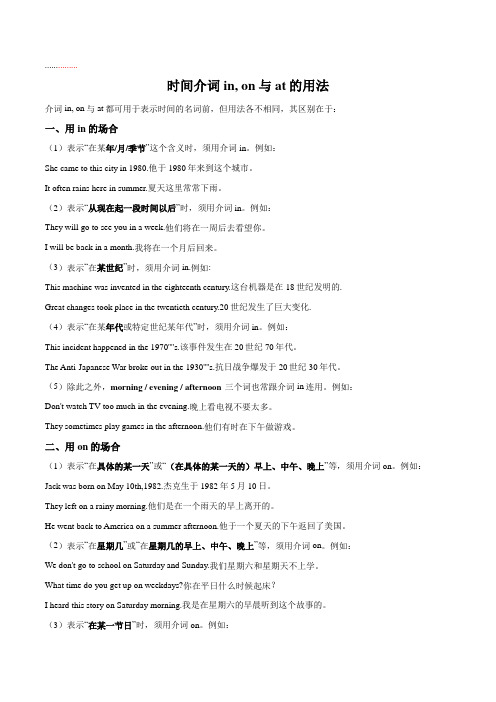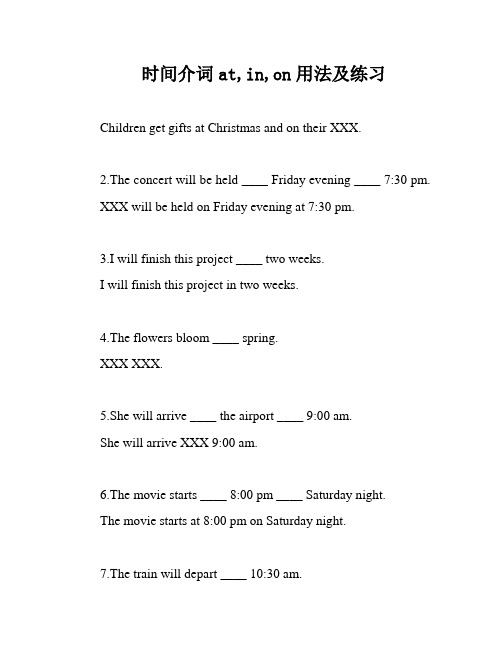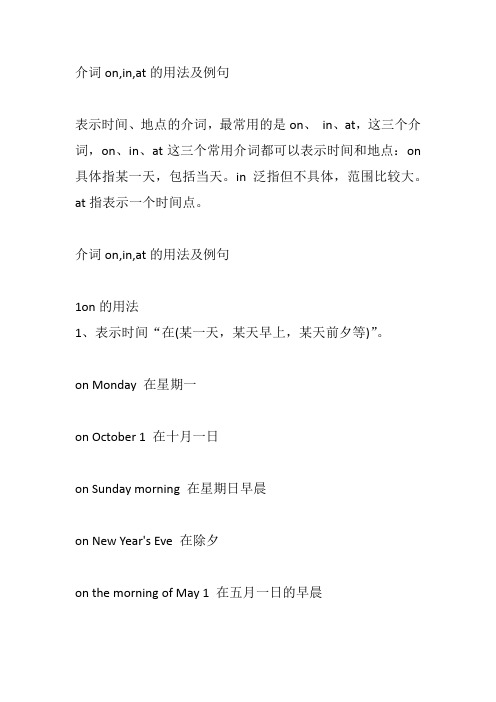时间介词at,in,on用法及练习
In、on、at介词在地点表示中的应用练习

In、on、at介词在地点表示中的应用练习介词在地点表示中的应用是英语研究中的一个常见难点。
本文将通过一系列练来帮助大家更好地理解和掌握介词in、on、at的用法。
一、in的使用1. 我们通常使用in来表示地点的大范围,比如国家、城市、地区等。
- 例句:He lives in China.(他住在中国。
)- 例句:There are many famous landmarks in Paris.(巴黎有许多著名的地标。
)2. 我们也可以使用in来表示在房间、建筑物等封闭的空间内。
- 例句:She is waiting for you in the office.(她在办公室等你。
)- 例句:The cat is hiding in the closet.(猫躲在衣柜里。
)3. 用于表示在一段时间内。
- 例句:I will meet him in an hour.(我将在一个小时内见到他。
)- 例句:They usually go skiing in winter.(他们通常在冬天去滑雪。
)二、on的使用1. on常用来表示具体的表面或位置。
- 例句:The book is on the table.(书在桌子上。
)- 例句:He is standing on the bridge.(他站在桥上。
)2. 表示某个特定的日期或具体的某一天。
- 例句:We always have a party on New Year's Eve.(我们总是在除夕夜开派对。
)- 例句:I have a meeting on Monday.(星期一我有个会议。
)3. 还可以用于表示在电视、广播等媒体上。
- 例句:I saw the news on TV.(我在电视上看到了新闻。
)- 例句:They heard the announcement on the radio.(他们在广播上听到了通知。
)三、at的使用1. at通常用来表示具体的点、位置或地址。
介词in,on,at及其练习附答案(解析版)

...............时间介词in, on与at的用法介词in, on与at都可用于表示时间的名词前,但用法各不相同,其区别在于:一、用in的场合(1)表示“在某年/月/季节”这个含义时,须用介词in。
例如:She came to this city in 1980.他于1980年来到这个城市。
It often rains here in summer.夏天这里常常下雨。
(2)表示“从现在起一段时间以后”时,须用介词in。
例如:They will go to see you in a week.他们将在一周后去看望你。
I will be back in a month.我将在一个月后回来。
(3)表示“在某世纪”时,须用介词in.例如:This machine was invented in the eighteenth century.这台机器是在18世纪发明的.Great changes took place in the twentieth century.20世纪发生了巨大变化.(4)表示“在某年代或特定世纪某年代”时,须用介词in。
例如:This incident happened in the 1970''''s.该事件发生在20世纪70年代。
The Anti-Japanese War broke out in the 1930''''s.抗日战争爆发于20世纪30年代。
(5)除此之外,morning / evening / afternoon三个词也常跟介词in连用。
例如:Don't watch TV too much in the evening.晚上看电视不要太多。
They sometimes play games in the afternoon.他们有时在下午做游戏。
二、用on的场合(1)表示“在具体的某一天”或“(在具体的某一天的)早上、中午、晚上”等,须用介词on。
时间介词at,in,on用法及练习

时间介词at,in,on用法及练习Children get gifts at Christmas and on their XXX.2.The concert will be held ____ Friday evening ____ 7:30 pm. XXX will be held on Friday evening at 7:30 pm.3.I will finish this project ____ two weeks.I will finish this project in two weeks.4.The flowers bloom ____ spring.XXX XXX.5.She will arrive ____ the airport ____ 9:00 am.She will arrive XXX 9:00 am.6.The movie starts ____ 8:00 pm ____ Saturday night.The movie starts at 8:00 pm on Saturday night.7.The train will depart ____ 10:30 am.The train will depart at 10:30 am.8.The party will be held ____ my house ____ Saturday.The party will be held at my house on Saturday.9.The concert will be held ____ the summer.The concert will be held in the summer.10.She will return from her trip ____ two weeks.She will return from her trip in two weeks.1.----He arrived ____ Sunday morning and left ____ Monday evening.A。
介词in,on,at与其练习附答案

时间介词 in, on 与 at 的用法介词 in, on 与 at 都可用于表示时间的名词前,但用法各不相同,其区别在于:一、用 in 的场合(1)表示“在某年/月 /季节”这个含义时,须用介词in。
例如:For personal use only in study and research; not for commercial useShe came to this city in 1980他.于 1980 年来到这个城市。
It often rains here in summer夏.天这里常常下雨。
(2)表示“ 从现在起一段时间以后”时,须用介词in。
例如:For personal use only in study and research; not for commercial useThey will go to see you in a week.他们将在一周后去看望你。
I will be back in a month. 我将在一个月后回来。
(3)表示“在某世纪”时,须用介词in.例如 :For personal use only in study and research; not for commercial useThis machine was invented in the eighteenth century这.台机器是在 18 世纪发明的 .Great changes took place in the twentieth century.20世纪发生了巨大变化 .(4)表示“在某年代或特定世纪某年代”时,须用介词in。
例如:For personal use only in study and research; not for commercial useThis incident happened in the 1970''''s该.事件发生在 20 世纪 70 年代。
介词in,on,at及其练习附答案

介词in,on,at及其练习附答案仅供个人参考时间介词in, on与at的用法介词in, on与at都可用于表示时间的名词前,但用法各不相同,其区别在于:一、用in的场合(1)表示“在某年/月/季节”这个含义时,须用介词in。
例如:For personal use only in study and research; not for commercial useShe came to this city in 1980.他于1980年来到这个城市。
It often rains here in summer.夏天这里常常下雨。
(2)表示“从现在起一段时间以后”时,须用介词in。
例如:For personal use only in study and research; not for commercial useThey will go to see you in a week.他们将在一周后去看望你。
I will be back in a month.我将在一个月后返来。
(3)表示“在某世纪”时,须用介词in.例如:For personal use only in study and research; not for commercial useThis machine was invented in the eighteenth century.这台机器是在18世纪发明的.Great changes took place in the twentieth century.20世纪产生了宏大变革.(4)透露表现“在某年月或特定世纪某年月”时,须用介词in。
比方:For personal use only in study and research; not for commercial useThis incident happened in the 1970''''s.该事件发生在20世纪70年代。
介词in,on,at及其练习附答案(解析版)

介词in,on,at及其练习附答案(解析版)介词in、on和at在表示时间的名词前的使用有所不同。
具体区别如下:一、使用in的情况:1.表示“在某年/月/季节”时,需要使用介词in。
例如:她于1980年来到这个城市。
夏天这里经常下雨。
2.表示“从现在起一段时间以后”时,需要使用介词in。
例如:他们将在一周后去看望你。
我将在一个月后回来。
3.表示“在某个世纪”时,需要使用介词in。
例如:这台机器是在18世纪发明的。
20世纪发生了巨大变化。
4.表示“在某个年代或特定世纪某个年代”时,需要使用介词in。
例如:该事件发生在20世纪70年代。
抗日战争爆发于20世纪30年代。
5.除此之外,morning、evening和afternoon三个词也常与介词in连用。
例如:晚上看电视不要太多。
他们有时在下午做游戏。
二、使用on的情况:1.表示“在具体的某一天”或“(在具体的某一天的)早上、中午、晚上”等,需要使用介词on。
例如:杰克生于1982年5月10日。
他们是在一个雨天的早上离开的。
他于一个夏天的下午返回了美国。
2) 表示星期几或其时间,需使用介词on。
例如:我们星期六和星期天不上学。
平日你几点起床?我是在星期六的早晨听到这个故事的。
3) 表示某个节日,需使用介词on。
例如:我们通常在中秋节吃月饼。
胡老师在教师节那天收到了一张卡片。
1) 表示具体时间点,需使用介词at。
例如:他每天六点起床。
昨天下午五点半我到家了。
2) 表示特定的时节或时机,需使用介词at。
例如:他们那时很幸福。
我认为商店在白天的这个时候关门了。
3) 表示中午、夜晚或周末,需使用介词at。
例如:你中午经常做些什么?夜晚你能看到天空中有许多星星。
4) 表示某个年龄,需使用介词at。
例如:这个男孩在九岁的时候就游泳游得很好了。
When I was twenty years old。
I started teaching English at a school。
时间介词In、on、at的课堂讲解与练习

时间介词In、on、at的课堂讲解与练习介绍本文将讲解英语中常用的时间介词In、on、at的用法,并提供相关练。
In的用法- 用于表示某个时间段内,常与年、月、季节、早晨、下午、晚上等词连用。
- 例如:in 2022, in August, in summer, in the morning, in the evening- 用于表示将来的某个时间段。
- 例如:in two weeks, in the near futureOn的用法- 用于表示某一天、日期、星期等具体的时间点。
- 例如:on Monday, on January 1st, on Christmas Day- 用于表示某个特定的节日。
- 例如:on New Year's Day, on Easter SundayAt的用法- 用于表示具体的时刻。
- 例如:at 8 o'clock, at noon, at midnight- 用于表示某个特定的时间点。
- 例如:at sunrise, at sunset练请根据上述介绍,填入适当的时间介词。
1. I will meet you at the park on Sunday.at the park on Sunday.2. The party will be held in the evening on New Year's Eve.in the evening on New Year's Eve.3. She was born in September at 10 o'clock in the morning.in September at 10 o'clock in the morning.4. We usually go skiing in winter at the weekend.in winter at the weekend.5. The concert will start at 8:30 PM on Friday.at 8:30 PM on Friday.总结通过研究In、on、at的用法,我们可以更准确地表达时间。
介词on,in,at的用法及例句

介词on,in,at的用法及例句表示时间、地点的介词,最常用的是on、in、at,这三个介词,on、in、at这三个常用介词都可以表示时间和地点:on 具体指某一天,包括当天。
in泛指但不具体,范围比较大。
at指表示一个时间点。
介词on,in,at的用法及例句1on的用法1、表示时间“在(某一天,某天早上,某天前夕等)”。
on Monday 在星期一on October 1 在十月一日on Sunday morning 在星期日早晨on New Year's Eve 在除夕on the morning of May 1 在五月一日的早晨He went home on Monday last week.他在上星期一回家了。
2、表示位置“在...上”(与物体接触)There is a map of world on the wall.墙上有一幅世界地图3、表示“关于”(表示关系)。
We will have a talk on the history of the Party this afternoon.今天下午我们有关于党史的报告。
What about your idea on the subject?关于这个问题你有什么看法?4、引申意义,表示“从事...”“处于...情况中”。
They are on holiday.他们在度假。
2in的用法1、表示时间(年、月、季节、早晨、下午、晚间等) in 1976 在1976年in October 在十月in spring 在春天in the morning/afternoon/evening 在早上/下午/晚上I will come in a week.我一周后回来。
2、表示地点、场所。
The bullet wounded me in the leg.子弹打伤了我的腿。
3、表示“穿着、戴着(衣服、帽子等)”。
The girl in red is Li Ming's sister.穿红衣服的女孩是李明的妹妹。
- 1、下载文档前请自行甄别文档内容的完整性,平台不提供额外的编辑、内容补充、找答案等附加服务。
- 2、"仅部分预览"的文档,不可在线预览部分如存在完整性等问题,可反馈申请退款(可完整预览的文档不适用该条件!)。
- 3、如文档侵犯您的权益,请联系客服反馈,我们会尽快为您处理(人工客服工作时间:9:00-18:30)。
时间介词(at, in ,on) 的用法与练习
1. at指时间表示:
(1)时间的一点、时刻等。
如:
They came home at sunrise (at noon, at midnight, at ten o’clock, at daybreak, at dawn). (2)较短暂的一段时间。
可指某个节日或被认为是一年中标志大事的日子。
如:
He went home at Christmas (at New Year, at the Spring Festival, at night).
2. in指时间表示:
(1)在某个较长的时间(如世纪、朝代、年、月、季节以及泛指的上午、下午或傍晚等)内。
如:
in 2004, in March, in spring, in the morning, in the evening, etc
(2)在一段时间之后。
一般情况下,用于将来时,谓语动词为瞬间动词,意为“在……以后”。
如:
He will arrive in two hours.
谓语动词为延续性动词时,in意为“在……以内”。
如:
These products will be produced in a month.
注意:after用于将来时间也指一段时间之后,但其后的时间是“一点”,而不是“一段”。
如:
He will arrive after two o’clock.
3. on指时间表示:
(1)具体的时日和一个特定的时间,如某日、某节日、星期几等。
如:
On Christmas Day(On May 4th), there will be a celebration.
(2)在某个特定的早晨、下午或晚上。
如:
He arrived at 10 o’clock on the night of the 5th.
(3)准时,按时。
如:
If the train should be on time, I should reach home before dark.
练习
( ) 1. Children get gifts ____ Christmas and ____ their birthdays.
A. on; on
B. at; on
C. in; in
D. in; on
( ) 2.----There is nothing ____tomorrow afternoon, is there? -----No. We can have a game of table tennis.
A. on
B. in
C. out
D. up
( ) 3. A lot of students in our school were born ____ March, 1981.
A. in
B. at
C. on
D. since
( ) 4. He suddenly returned____ a rainy night.
A. on
B. at
C. in
D. during
( ) 5. My grandfather was born ____ Oct. 10, 1935.
A. on
B. in
C. at
D. of
( ) 6. The train is starting ___ five minutes.
A. in
B. at
C. for
D. still
( ) 7. Mike does his exercises ____ seven _____ the evening.
A. on; to
B. at; in
C. by; of
D. at; on
( ) 8. Children wake up very early ____ the morning of Christmas Day.
A. in
B. on
C. for
D. at
( ) 9 ____ a cold winter morning, I met her in the street.
A. In
B. On
C. At
D. For
( ) 10 It happened to be very cold____ the morning of our sports meeting.
A. at
B. on
C. with
D. of
( ) 11. Why did you get up so early ___ this morning.
A. on
B. /
C. at
D. in
( ) 12. He went to Shanghai___ September 3, 1991 and came back___ a cold morning last year.
A. in; on
B. on; in
C. on; on
D. in; in
( ) 13. Lucy was born____ the night of May 12, 1984. . ...
A. on
B. in
C. at
D. to
( ) 14. Mrs Brown came to China ____ 1996.
A.on
B. of
C. to,
D. in
( ) 15 ___ the morning of November 20, 1915, the workers came to Chicago to show their mourning of Joe Hill.
A. On
B. In
C. On
D. At
( ) 16. Ann moved ___ Hangzhou ___ September, 1992.
A. /; in
B. to; in
C. to; on D, in; in
( ) 17. They started off ___ an autumn afternoon.
A. during
B. at
C. in
D. on
( ) 18. He often goes ____ school ____ six thirty ____ the morning.
A. for; to; in
B. to; at; in
C. to; for; at D, for; at; to
( ) 19. He arrived ___ Shanghai ___ 9: 30 ___ March 5.
A. at; in; at
B. to; on; at
C. in; on; at
D. in; at; on
( ) 20.The English teacher told me to get there____ half past ten.
A: in B. at C. on D. of
答案:
B A A A A A B B B B B
C A
D B A D B D B
但具体落到实处应该是一种尊重,一种接人待物的方式方法。
和文化知识有关,但不是必然,主要来自家庭的影响和后天的修为。
赫本被誉为女神,不仅仅因其貌美,貌美的很多,并不能被全世界的人记住;也不是因为学历,比她学历高的比比皆是。
但她用她的一生诠释了修养这个概念,她在遗言里这样说“若要优美的嘴唇,就要讲亲切的话。
手不仅能解决自身问题还能帮助别人;脑不仅能原谅别人还可以让自身不断进步。
我们身上每个零件都有用处,那些喜欢到处释放物质垃圾和精神垃圾的人都是不健全的。
看过很多父母抱怨自己的孩子不如旁人,那就看看自己是不是样样都行,孩子其实就是站在你面前的镜子。
在发成绩单时,在开家长会时,你恼怒了,你大打出手了,这恰恰暴露你精神世界的粗鄙。
我倒是很感动一句话”不需要你养老,只感谢让我参与你的成长。
“
若要可爱的眼睛,就要看到别人的好处;若要苗条的身材,就要把你的食物分享给饥饿的人。
若要美丽的秀发,在于每天有孩子的手指穿过它;若要优雅的姿态,走路时要记住行人不只你一个。
人之所以为人,是必须充满精力,自我悔改,自我反省,自我成长;
并非向人抱怨;当你需要帮助的时候,你可以求助于自己的双手;
在年老之后,你会发现自己的双手能解决很多难题,一只手用来帮助自己,另一只用来帮助别人。
这就是对修养最好的解读,也是做人的最高境界,更是心灵之美与外在之美完美的结合。
并且修养之美无处不在渗透影响着你的外在之美。
如果大家都能做到,那么我们都是天使。
她告诉我们手是用来劳动而不是索取的,脑是用来忏悔而不是偏执的。
手不仅能解决自身问题还能帮助别人;脑不仅能原谅别人还可以让自身不断进步。
